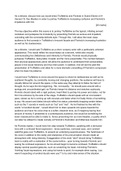As a director, discuss how you would direct Truffaldino and Florindo in Scene Eleven of A
Servant To Two Masters in order to portray Truffaldino's increasing confusion and Florindo's
impatience with him.
[25 marks]
The key objective within this scene is to portray Truffaldino as the typical, irritating servant
caricature and juxtapose his immaturity by presenting Florindo as serious and impatient,
coinciding with the commedia dell'arte style. Through this, I will allow the lower class
audience to find comedy in Truffaldino's innocent facade and Florindo's increasing frustration
as well as his cluelessness.
As a director, I would cast Truffaldino as a short, scrawny actor with a particularly unkempt
appearance. This would reflect his social status as a servant, whilst also visually
communicating his childishness and inferiority to Florindo. Florindo would physically
juxtapose Truffaldino, being taller, broader and far more presentable. The contrast between
their physical appearances alone will allow the audience to understand their personalities,
places in the social hierarchy and thus their power. In addition, this will aid the pest-like
presentation of Truffaldino and allow for a more dramatic unravelling of Florindo's composure
when he loses his patience.
I would have Truffaldino to move around the space to show his restlessness as well as his
scattered thoughts; by constantly moving and changing positions, the audience will have to
visually follow him around the space, in the same way they attempt to follow his train of
thought. As he says the line beginning, “No, not exactly..” he should pace around with a
springy and uncoordinated gait, as Florindo keeps his distance and watches cautiously.
Florindo should stand with a rigid posture, head tilted to portray his power and status, not far
from his entrance by the side of the stage. Truffaldino should speak with an inconsistent
pace, slower as he is coming up with excuses and faster when he finally thinks of something
to say. His accent and dialect should reflect his status, potentially dropping certain letters
such as the ‘t’ sounds in words such as “but” and ”met”. As he finishes his line with the
words “a hundred ducats”, I would direct him to stare upwards into space towards the
audience and have his voice drop to a softer, dreamier tone, as if imagining having that
amount of money. If presented to a contemporary audience, this would be something the
lower classwould be able to relate to, hence presenting him as more likeable, a quality which
can later be utilised to create comedy at Florindo’s frustration and bitterness towards him.
As Florindo replies, I would have him step towards Truffaldino, speaking with a bemused
tone with a confused facial expression - tense eyebrows, narrowed eyes, and constant
watchful gaze over Truffaldino, to present an underlying suspiciousness. The harshness of
his voice in addition to the clarity and sharpness of his pronunciation should create an
atmosphere with rising intensity. Exaggeration of the word “devil” should bring Truffaldino
back to reality with a realisation of the scene before - upon turning towards Florindo and
seeing his confused expression, he too should begin to become confused. Truffaldino should
display several puzzled gestures, such as scratching his head, mimicking Florindo's
‘thinking’ facial expressions, and using his hands to point, for example when saying, “you
weren't expecting a hundred ducats were you?” to try and make sense of the situation.




